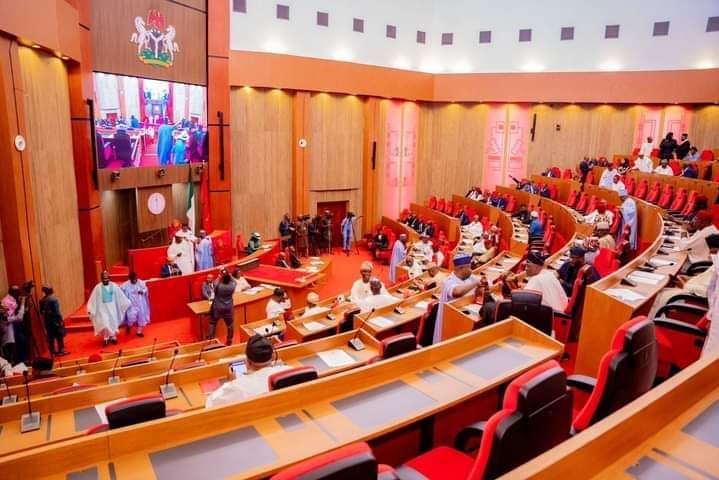The Senate has passed two out of four major tax reform bills proposed by President Bola Tinubu.
However, the upper chamber rejected a proposal to increase the value-added tax (VAT) to 10 percent, opting to retain the current rate at 7.5 percent.
The bill allows VAT input claims on fixed assets, overhead costs and administrative services.
The two bills passed are the Nigeria Revenue Service Establishment bill, which repeals the Federal Inland Revenue Service, and the Joint Revenue Board Establishment bill, which seeks to harmonise tax collection.
Two bills which the senate has scheduled for consideration and passage on Thursday are the Nigeria Tax Administration bill and the Nigeria Tax bill.
The passage of two bills on Wednesday followed a clause-by-clause consideration of the bills in the committee of the whole and a third reading on the floor of the senate.
President Tinubu transmitted the bills to the senate as part of efforts to modernise and overhaul the country’s tax framework.
Senate President Godswill Akpabio commended the progress and said the reforms would strengthen governance and improve revenue collection.
“These bills will add immense value to governance and transform how taxes are collected and shared in Nigeria,” Akpabio said.
He also said the senate is ready to extend its sitting to conclude work on the remaining bills.
“We are committed to concluding the outstanding bills tomorrow, even if we have to stay here until 10 pm,” he added.
Apart from the rejection of a proposal to increase VAT from 7.5 to 10 percent, the Akpabio who read the resolutions, said the senate also rejected the proposed phasing out of funding for some agencies.
The agencies include the Tertiary Education Trust Fund (TETFUND), the National Information Technology Development Agency (NITDA) and the National Agency for Science and Engineering Infrastructure (NASENI).
Instead, Akpabio said the red chamber introduced a 4 percent development levy to sustain funding for the agencies.
“These agencies of government are essential for human capital and overall economic development of the country,” he said.
“Phasing out their funding can lead to stagnation in education and the country losing out on technological evolutions and advancements.”
According to the bill, the development levy will be distributed as follows: TETFUND (50%), Nigerian Education Loan Fund (15%), NITDA (10%), NASENI (10%), National Cybersecurity Fund (5%) and Defence Security Fund (10%).
The company income tax rate is pegged at 30 percent.
Speaking during the plenary, Deputy Senate President Barau Jibrin praised the maturity displayed by lawmakers in resolving earlier disagreements.
“It is time to congratulate the entire senate and in particular, the committee on finance and the elders committee for the wisdom and leadership that have been shown in these bills,” he said.
“Initially, there were disagreements and there were rancours here and there. But the senate, standing on its position as the highest assembly in the land, decided to establish this committee, a committee of elders, to look at all those areas of contention and hear the views of religious leaders, regional organisations and other stakeholders.
“Now, thank God, the committee also in its wisdom sat with all, had a very robust public hearing and got to where we are now. And thank God, all these areas have been resolved.”
The four bills have already been passed by the house of representatives.
WARNING: If You Are Not 18+, Don’t Click The Link Below 👇🫣
https://disloyalmoviesfavor.com/m3e85u39j?key=f0014e9d9438d5115e4d66e73ca3f04b
https://poawooptugroo.com/4/8902554
Please don’t forget to “Allow the notification” so you will be the first to get our gist when we publish it.
Drop your comment in the section below, and don’t forget to share the post.
Never Miss A Single News Or Gists, Kindly Join Us On WhatsApp Channel:
https://whatsapp.com/channel/0029Vad8g81Eawdsio6INn3B
Telegram Channel:
https://t.me/gistsmateNG





